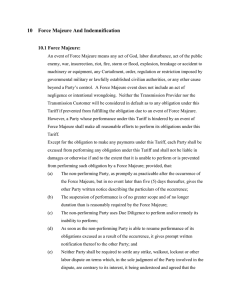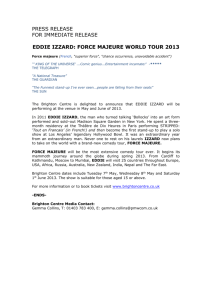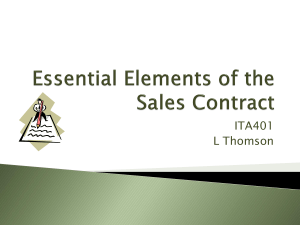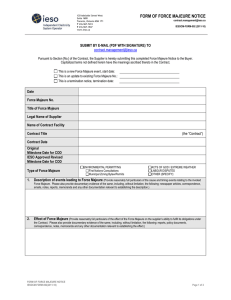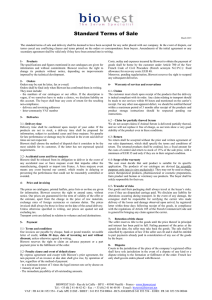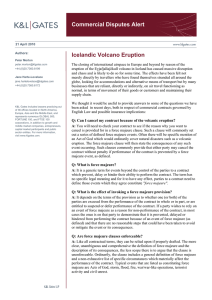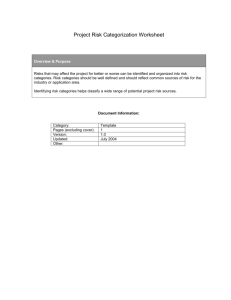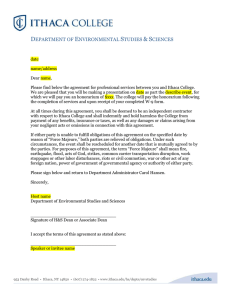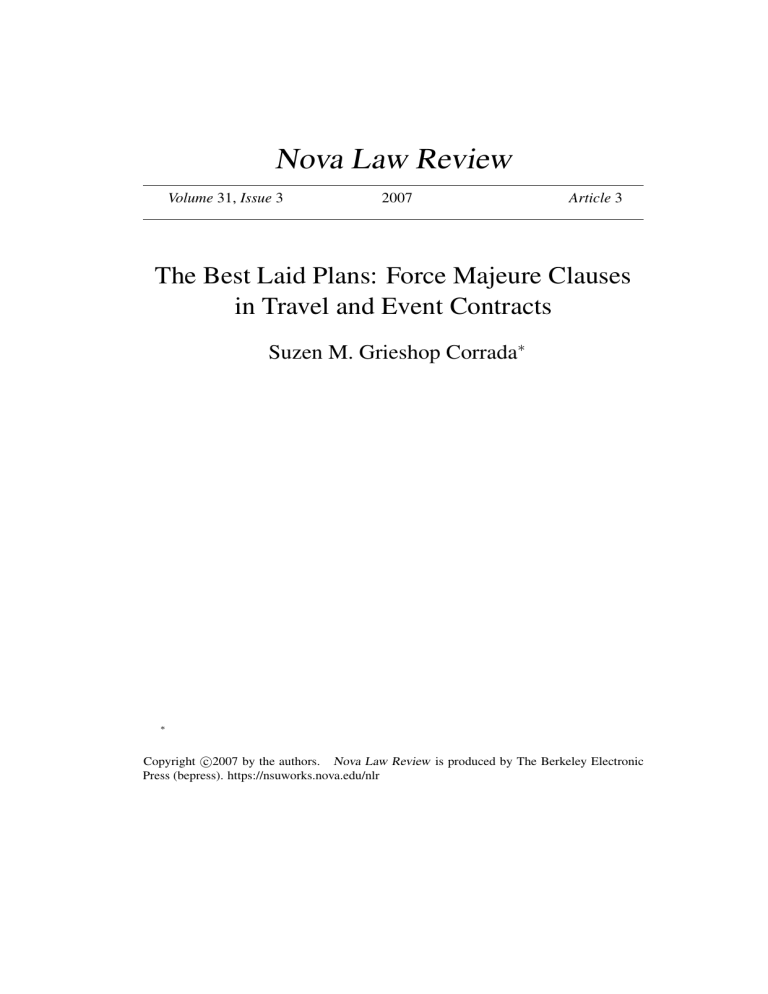
Nova Law Review Volume 31, Issue 3 2007 Article 3 The Best Laid Plans: Force Majeure Clauses in Travel and Event Contracts Suzen M. Grieshop Corrada∗ ∗ Copyright c 2007 by the authors. Nova Law Review is produced by The Berkeley Electronic Press (bepress). https://nsuworks.nova.edu/nlr Grieshop Corrada: The Best Laid Plans: Force Majeure Clauses in Travel and Event Co THE BEST LAID PLANS: FORCE MAJEURE CLAUSES IN TRAVEL AND EVENT CONTRACTS + SUZEN M. GRIESHOP CORRADA* I. II. 409 INTRODU CTION ............................................................................... FORCE MAJEURE CLAUSES IN THE AIRLINE INDUSTRY ................. 410 III. FORCE A. B. C. IV. V. CONSTRUCTING A FORCE MAJEURE CLAUSE ................................ 420 421 C ON CLU SION .................................................................................. MAJEURE CLAUSES AND EVENT PLANNING ....................... Negotiating the Event Contract......................................... The Force Majeure or "Eeyore" Clause .......................... Attrition and Event Insurance........................................... 413 413 415 418 I. INTRODUCTION Once an optional addition to a contract, force majeure' clauses are becoming a staple in travel and event planning. A contract with a force majeure clause can excuse nonperformance when circumstances occur that exceed the control of the parties and precludes performance.2 These clauses can be found in travel and event contracts worldwide, in companies both large and small, as a proactive measure to protect both the hospitality provider and the client. 3 With the ominous threat of hurricanes, tornados, earth+ Robert Bums, To a Mouse, on Turning Her up in Her Nest with the Plough, in THE WORKS OF ROBERT BURNS, ROBERT BURNS COUNTRY, available at http://www.robertbums.org/works/75.shtml. * J.D., Nova Southeastern University, Shepard Broad Law Center, B.A., St. Leo College. The author is a judicial clerk for the Honorable Melanie G. May, Fourth District Court of Appeal, West Palm Beach, Florida. She would like to thank Judge May for her guidance during the past year and Nova Law Review Editor-in-Chief, Joanne Charles for her assistance with the publication of this article. The author also wishes to acknowledge the love and support of her husband, Martin Corrada, daughter, Eva Corrada, parents Paul T. and Hazel Uritza Grieshop, and the Uritza, Grieshop, Melvin, Bozeman, Cacho, and Corrada families. 1. The term force majeure "is French for 'overpowering force' or 'coercive power.' Paul Grimes, PracticalTraveler: When a Tour's Promises Can't Be Met, N.Y. TIMES, Sept. 6, 1981, at A3. 2. See L'Oreal USA, Inc. v. PM Hotel Assoc., L.P., No. 56315CV2005 (N.Y. Civ. Ct., N.Y. County Mar. 13, 2006). 3. This article will focus on travel and event planning contracts in the United States, rather than individual states or international countries. See Hyatt Corp. v. Personal Commc'n Indus. Assoc., No. 04-C-4656, 2004 WL 2931288, at *5 (N.D. I11. Dec. 15, 2004) (holding that the laws of different states rendered the force majeure clauses in an event contract nonidentical). The application of civil law, as opposed to common law, in fault situations, is COMPLETE Published by NSUWorks, 2007 1 Nova Law Review, Vol. 31, Iss. 3 [2007], Art. 3 NOVA LA WREVIEW [Vol. 31 quakes, snowstorms, and typhoons, as well as terrorism and disease-related conditions, a contract is not safe without a well-written force majeure clause. II. FORCE MAJEURE CLAUSES IN THE AIRLINE INDUSTRY The Federal Aviation Administration (FAA) Aerospace Forecast for the Fiscal Years of 2007-2020 predicts that 768 million passengers will be flying during the 2007 fiscal year, over 1 billion passengers by 2015, and 1.2 billion by 2020.' This forecast also predicts that there will be approximately 62.5 million take-offs and landings in the larger airports of the United States.5 Simultaneously, consumer complaints skyrocketed with the Department of Transportation as passengers voiced their unhappiness regarding their airline travel experience.6 An overwhelming majority of travel delays were caused by a combination of inclement weather and air traffic control systems that are antiquated and ill-equipped to handle the volume of modem transportation. 7 In the future, the situation will become worse unless a system is implemented that can meet the needs of the traveling public while anticipating the unexpected conditions of a force majeure.' different in both domestic and international contracts. UGO DRAETrA, RALPH B. LAKE, & VED P. NANDA, Transnational Contract Law, in THE LAW OF TRANSNATIONAL BUSINESS TRANSACTIONS § 4:49 (Ved P. Nanda & Ralph B. Lake eds., 2006); see also Mark B. Baker, "AHard Rain's A-Gonna Fall"-Terrorism and Excused Contractual Performance in a Post September 11th World, 17 TRANSNAT'L LAW. 1 (2004). Force majeure "situations exempt tour operators from obligations to provide refunds or alternate travel arrangements" in Ontario, "Quebec and B.C., while the rest of Canada has no such regulations in place." Douglas McArthur, Resort Refugees, GLOBE & MAIL (Can.), Oct. 29, 2005, at T2, available at http://www.theglobeandmail.com/servlet/story/LAC.20051029.DISASTER29/TPStory/ Travel. 4. Press Release, Federal Aviation Administration, FAA Forecasts Steady Growth in Air Travel Demand: Secretary Peters Cautions that Growing Delays Will Continue Without Changes (Mar. 15, 2007), http://www.faa.gov/news/pressreleases/news-story.cfin?newsld= 8358 [hereinafter FAA Forecasts Steady Growth]. 5. Id 6. Linda Burbank, When You Get Bad News at the Airport, What Are Your Rights? USA TODAY, Sept. 27, 2006, at E5. 7. Anita Dunham-Potter, What Are My Rights When Air-Traffic Control or Other Delays That Are "Out of the Airlines Control" Affect My Travel Plans? ANITAVACATION.COM, http://www.Anitavacation.com/askanita/QA/airtravelqaWhat200l0201.shtml (last visited June 1, 2007) [hereinafter Dunham-Potter, What Are My Rights]. "It is anticipated that airport congestion will get worse before it improves." Margaret P. Fogg, Air Rage: Is It a Global Problem? What Proactive Measures Can Be Taken to Reduce Air Rage, and Whether the Tokyo Convention Should Be Amended to Ensure Prosecution ofAir Rage Offenders? 7 ILSA J. INT'L & COMP. L. 511, 518 (2001). 8. Id. "Delays last year reached an all time high and now cost the nation's economy over $10 billion annually." FAA Forecasts Steady Growth, supra note 4. The proposed solu- https://nsuworks.nova.edu/nlr/vol31/iss3/3 2 Grieshop Corrada: The Best Laid Plans: Force Majeure Clauses in Travel and Event Co 2007] FORCEMAJEURE CLA USES IN TRAVEL AND EVENT CONTRACTS 411 The airline industry has utilized force majeure clauses for years; however, with the changes in our world and the influx of issues beyond an airline's control, gone are the days of free hotel rooms and vouchers as compensation for travel delays. 9 "An airline reservation is a legal contract"' ° and the force majeure clauses in these contracts are becoming "watertight." 1 In the event of a force majeure, an airline passenger's rights are detailed in the airline's "contract of carriage."' 2 The contract of carriage is usually posted on the airline's website and available, upon request, at the airport.' 3 Buried in the fine print and legalese is a force majeure clause which generally includes a multitude of items that are beyond the control of the airline. 14 Items listed begin with inclement weather, but also include: labor disputes, fuel shortages, labor shortages, government regulations, civil unrest, wars, political unrest, embargos, unsettled international conditions, riots, air traffic control issues, and any other occurrence not reasonably anticipated, foreseen or predicted by the airline. 5 "[A]irlines do not guarantee their schedules, and they are not required to assist or compensate passengers for flights delayed or canceled by bad weather or other causes [deemed] beyond their control, collectively known as tion to this problem entails, "Replacing our dated air traffic control architecture with a 21st Century satellite-based system [which] will return freedom, convenience and reliability to the skies." Id.(quoting Mary E. Peters, U.S. Secretary of Transportation). 9. When Your Trip Goes South: How "Contract of Carriage" Changes Affect Fliers' Rights, FORT WORTH STAR-TELEGRAM, Apr. 5, 2006, at A2 [hereinafter Trip Goes South]. 10. Ed Perkins, Travel Plans Ruined? Consider Taking Those Guilty to Court, CHI. TRIB., Jan. 1, 2006, at 3. 11. Christopher Elliott, American Errlines, CHRISCROSSINGS, July 29, 1999, http://www.elliott.org/ask/1999/craa.htm [hereinafter Elliott, American Errlines]. 12. Cindy Loose, When the Skies Are Unfriendly: How Contract of CarriageChanges Affect Fliers' Rights, WASH. POST, Mar. 12, 2006, at P05. The contract of carriage is also referred to as a "conditions of carriage" or "general rules tariff." See Elliott, American Errlines, supra note 11; Al Anolik, Rule 240: Don't Leave Home Without It! MY TRAVEL RIGHTS.COM, http://www.mytravelrights.com/travellaw.cfin?ai=3 (last visited June 1, 2007); Jane Engle, Sometimes Those Flight Vouchers Are Like a Lump of Coal, L.A. TIMES, Dec. 25, 2005, at lF. 13. Susan Stellin, PracticalTraveler: Those Uncertain Air Connections, N.Y. TIMES, Feb. 10, 2002, at 5.4. 14. Trip Goes South, supra note 9. Airlines generally "take responsibility for their own labor problems-but not the labor problems of other companies that might affect them." Loose, supra note 12. The majority of the major airlines take responsibility for their mechanical difficulties; however, some airlines categorize mechanical problems as a force majeure. Id. 15. Chris Davis, Planningand Managing Meetings, Bus. TRAVEL NEWS, Apr. 25, 2005, at 44; Loose, supra note 12; Dunham-Potter, What Are my Rights, supra note 7. Published by NSUWorks, 2007 3 Nova Law Review, Vol. 31, Iss. 3 [2007], Art. 3 NOVA LAWREVIEW [Vol. 31 force majeure."' 6 The only time that a passenger can expect compensation is for a flight delay resulting from the airline's action and not from the actions of others or an act of God.17 In the event of a force majeure, the airline's only obligation is to book the passenger on the next available flight or refund the airfare for the unused portion of the ticket.' 8 Since there are no federal requirements regarding how an airline handles passenger delays, the passenger is left to the mercy of the airline and can only wait for an elevation in the delay, or seek other options. 19 When booking travel for an event or conference, most airlines will allow the contractor to negotiate a lower group-rated airfare; however, the terms of the force majeure clause are generally nonnegotiable. 20 Additionally, in a force majeure situation, the airline is not under an obligation to refund to the client the cost of a hardship incurred if the delay affects the remainder of the travel itinerary. 2' Absent an insurance policy which covers 16. David Bear, Snow Snafu Suggestions, PITrSBURGH POST-GAzETrE, Feb. 19, 2006, at E2. A force majeure is defined as "an [a]ct of God (bad weather, etc.) that absolves an airline from compensating passengers after a delay or cancellation." Bill McGee, Learningthe Lan19, 2005, July USA TODAY.COM, Travel Industry, guage of the http://www.usatoday.com/travel/coluniist/mcgee/2005-07-19-mcgee x.htm. The term force majeure should not be confused with "force maneure," which is defined as "an act of airline management that is later denied by that airline." Id. 17. Bear, supra note 16. "The term 'act of God' has been widely defined as: Any accident, due directly and exclusively to natural causes without human intervention, which by no amount of foresight, pains, or care, reasonably to have been expected could have been prevented." James E. Mercante, That Sinking Feeling-A Boat Owner's Liability in the Aftermath of a Hurricane, 17 NOVA L. REV. 1053, 1055 (1993) (citing IA C.J.S. Act of God § 757 (1985)). An act of God is also defined as, "[a] disturbance... of such unanticipated force and severity as would fairly preclude charging a [defendant] with responsibility for damage occasioned by [the defendant's] failure to guard against it in the protection of property committed to its custody." Id. (quoting Compania de Vapores INSCO S.A. v. Missouri Pac. R.R., Co., 232 F.2d 657, 660 (5th Cir. 1956)). 18. Anita Dunham-Potter, How Travel Companies Handle Events That Are Beyond Their Control, ANITAVACATION.COM, Sept. 2001, http://www.Anitavacation.com/articles/misc/ How2001091 l.shtml [hereinafter Dunham-Potter, How Travel Companies Handle Events]. Airlines may offer phone cards or recommend nearby hotels that the airline has a negotiated rate with. Bear, supra note 16; Trip Goes South, supra note 9; Stellin, supra note 13. 19. Dunham-Potter, What Are My Rights, supra note 7. Rule 240 is a written outline detailing the passenger's rights and it is issued by individual airlines. See id. Specifically, it details airline procedure if an incident occurs, for example a scheduling or booking conflict that is within the airlines control. Id. Rule 240 does not cover force majeures. Id. If a passenger chooses to accept a refund for the portion of the flight that was delayed and seek alternative transportation, they are urged to verify that their return trip itinerary or the remaining portion of their booking is not accidentally canceled during the refund process. Stellin, supra note 13. 20. See Davis, supra note 15, at 42. 21. See Perkins, supra note 10. https://nsuworks.nova.edu/nlr/vol31/iss3/3 4 Grieshop Corrada: The Best Laid Plans: Force Majeure Clauses in Travel and Event Co 2007] FORCEMAJEURE CLAUSES IN TRAVEL AND EVENT CONTRACTS 413 the airfare, the passenger 2 or group is left with little or no recourse if a force majeure situation occurs. III. FORCE MAJEURE CLAUSES AND EVENT PLANNING Although the allure of idyllic weather and a picturesque location may influence many to contract events in different locales, with the introduction of stricter force majeure clauses in air travel, it may be safer and more reliable to plan the event closer to home. Unlike the one-sided force majeure clauses offered in an airline's contract of carriage,23 a hotel or convention facility will generally negotiate the terms of the contract with the client or event sponsor. 24 Absent the unpredictability of transporting a large group via airlines, an event planned closer to home may prove to be profitable in goodwill while saving the planner the stress of a multi-tasked itinerary. A. Negotiatingthe Event Contract Whether the event is scheduled at home or away, a multitude of details such as attrition, cancellation, force majeure, and dispute resolution should be accounted for in the contract. 25 It is necessary for the individual or corporate attorney to negotiate the specifics of the contract and ensure that the clearly defined requisites of the event have been addressed.2 6 "A poorly negotiated contract can cost a corporation thousands of dollars in unnecessary expenses, while a well-staged event can engender incalculable levels of goodwill" for the event sponsor. 7 22. David Bear, Stranded at the Airport, PITTSBURGH POST-GAZETTE, Sept. 24, 2006, at F2. 23. Susan Carey, Fliers Assail "Imprisonment" on Grounded Planes Thousands Stranded on Runways up to 11 Hours, PALM BEACH POST, Jan. 19, 1999, at IA. While each airline forms their specific rate plan, generally they will issue special offers to clients for group travel or large blocks of tickets purchased for a special event at a pre-determined destination. See Davis, supra note 15, at 43. These offers may include percentage rate discounts, special fares, additional frequent flyer miles, free freight, upgrades, and free bonus tickets or productivity tickets to the client or sponsor of the event. Id. 24. Id.at 43-44. 25. Id.at 44. The details of an event contract should also include: dates and times, contact names and information, function space specifics, food and beverage, liability and insurance, presence of other groups or events, ADA compliance, equipment requests and inventory, labor charges, parking, and if applicable, accommodations and guest specifics. Id. 26. See Davis, supranote 15, at 44. 27. Id.at 39. Published by NSUWorks, 2007 5 Nova Law Review, Vol. 31, Iss. 3 [2007], Art. 3 NOVA LA WREVIEW [Vol. 31 Prepare ahead of time by researching the facility that the client wishes to contract with. 28 Find out what other facilities offer, then weigh these as viable alternatives to add clarity to the property that is being considered.2 9 "During the site selection and negotiation process, ask to see a facility's standard contract, especially the fine print on [the] deposit, payment, attrition and termination and cancellation policies. 30 Clarify any ambiguities in the facilities standard contract and utilize this contract as a base for negotiations and discussions.31 If the facility offers acceptable provisions, "save your negotiating currency for something that isn't covered elsewhere. 32 Reiterate the specific goals of the client's event, what is expected of the facility, the transaction that will be occurring, and the law that will apply thereto.33 Negotiate a final agreement that incorporates the facility's standard language, the client's specific language, and the best interests of both parties into the negotiated contract. 34 All discussions and agreements should be solidified and included in this contractual writing.35 The writing should detail all of the relevant and important technical issues, in addition to the mundane, in an effort to avoid confusion and misunderstandings. 36 Once the contract is reduced to writing, it should be reviewed for content as well as scrivener's errors and other seemingly harmless but potentially litigious errors.37 28. J. Kent Newsome, Ten Rules for Ethical and Effective Negotiating,531 P.L.I. REAL EST. L. 1117 (2006). Advanced preparation and knowledge of the market rates can enable the client to assess the event facilities' price-to-value ratio, thereby resulting in a balanced and cost-effective outcome. See Davis, supra note 15, at 42. This advanced research is far more advantageous to the client than expert negotiation skills. Id. 29. Newsome, supra note 28, at 1119. 30. Davis, supra note 15, at 44. 31. See id. at 43-44. It is important to know the contract that you are negotiating. See Newsome, supra note 28, at 1119-21. 32. Newsome, supra note 28, at 1120. 33. See id at 1120-21. The event contract should cement what is expected of the client and the facility, thereby incorporating the purpose for the gathering, the client's goals for the event and, if applicable, the meeting's content. See Davis, supra note 15, at 44. 34. See Davis, supra note 15, at 44. 35. Id. 36. See id.; Andrea M. Teichman, Drafting and Negotiating Contracts, 3 MASS. BASIC PRAC. MANUAL ch. 12 (2007). 37. See Davis, supranote 15, at 44. When reviewing and evaluating the contract, ensure that the products and services offered by the facility have been accurately described and the expectations of the client have been clearly delineated. See Teichman, supra note 36. https://nsuworks.nova.edu/nlr/vol31/iss3/3 6 Grieshop Corrada: The Best Laid Plans: Force Majeure Clauses in Travel and Event Co 2007] FORCEMAJEURE CLAUSES IN TRAVEL AND EVENT CONTRACTS 415 38 The Force Majeure or "Eyeore" Clause B. The traditional law of contracts provides that, if there is no wording in the contract stating otherwise, one or both parties to the contract may terminate the contractual performance if the party's performance is made impracticable, impossible, or is frustrated by supervening events which would render the significance of the performance valueless to that party. 39 This fundamental legal principal is a default provision which is effectuated when a supervening act or occurrence has an effect on the event, and the parties did not assign the risk and consequences in the contractual agreement.4 ° If the parties to the contract do not want the peril of unintended consequences from future acts that transpire beyond their control, then the contractual agreement should thoroughly41 "address what [principles] will apply and what the consequences will be.", Successful event planning begins with the contractual language between the facility and client.42 One of the most important provisions that should be included in the event contract is the force majeure clause. Force majeure clauses, also referred to as "Acts of God and War" 43 or "Vis Major,"' are applicable when the execution of an event is prevented due to forces beyond the control of the facility or group, such as inclement weather, large-scale disasters, labor disputes, or civil unrest. 45 In a standard force majeure clause, no penalties are assessed to either party when the event must be terminated; however, "these clauses are susceptible to very different interpretations" based upon the specific language or the ambiguity of the writing.46 38. See Rohn K. Robbins, Force Majeure: Insurancefor the Forces of Nature, VAIL Oct. 2, 2006, available at http://www.vaildaily.com/article/20061002/ colums/l 10020039&SearchlD=7377558000220. Insurance for a force majeure "is insurance for that particle of Christopher Robin's pal, Eyeore, that dwells in a dark place in each of us. Gloom and doom insurance, if you will." Id. 39. John S. Foster, Migurus: Force Majeure Clauses (May 17, 2006), http://vnutravel.typepad.com/migurus/2006/05/forcemajeurec.html. 40. Id. 41. Id. 42. Id. 43. Davis, supra note 15, at 44. 44. Robbins, supra note 38. "Vis major means a greater or superior force." Id. 45. Davis, supra note 15, at 44. 46. Id. DAILY, Published by NSUWorks, 2007 7 Nova Law Review, Vol. 31, Iss. 3 [2007], Art. 3 NOVA LA W REVIEW [Vol. 31 "Force Majeure clauses are not just boilerplate anymore."47 In the wake of recent events and catastrophes that have occurred worldwide, it has become evident that some clauses are better constructed than others.4" A true force majeure can cause a materially adverse ripple effect, particularly in the travel and hospitality industry.49 Contingency planning is now a reality that clients and facilities must consider when scheduling an event.5" Therefore, a fully contemplated force majeure clause has become a necessity in all viable event contracts. 5 In a world where timing is everything, when a catastrophe occurs and an unevaluated force majeure clause comes into effect, litigation can and will ensue. Ambiguity is a common cause for litigating a force majeure clause.5" When "a written instrument lends itself to more than one reasonable interpretation, it is ambiguous. 53 In many cases an extensive list of potential force majeure events is a party's best defense against a claim of ambiguity.5 4 A well structured clause should specifically include the conditions that will inhibit or prevent a party's performance.5 5 This detailed clause will force the 47. William A. Tanenbaum & Kaye Scholer, Force Majeure Is Not Just for Boilerplate Anymore: Why Combining Force Majeure and Disaster Recovery Provisions Makes Sense, 880 P.L.I. PAT. 85, 89 (2006). "A traditional force majeure clause would excuse the vendor from performing and would provide an unwarranted 'get out of jail free card."' Id. 48. Jed Mandel, A New Appreciationfor Force Majeure Clauses, MEETINGSNET.COM, Mar. 19, 2003, http://meetingsnet.com/news/meetingsnew appreciationforce/ [hereinafter Mandel, A New Appreciation]. 49. Inn at the Center, LLC v. Seattle, No. 52241-8-I, 2004 WL 418021, at *2 (Wash. Ct. App. Mar. 8, 2004); Judy DeHaven, Jersey Firms Cope with Storms Rita andKatrinaAffected Plenty of Companies with Gulf Coast Operations, STAR-LEDGER (Newark, N.J.), Sept. 27, 2005, at 31. Hurricane Katrina affected New York based travel and real estate company Cendant's daily business and bottom line. Id. 50. Foster, supra note 39; see L'Oreal USA, Inc. v. PM Hotel Assoc., L.P., No. 56315CV2005 (N.Y. Civ. Ct. Mar. 13, 2006) (noting that the contract presented to the court did not contain a force majeure clause listing examples as an excuse for nonperformance). 51. Foster, supra note 39; see generally N. Ins. Co. of N.Y. v. Pelican Point Harbor, Inc., 19 Fla. L. Weekly Fed. D722 (N.D. Fla. 2006) (holding that summary judgment is denied because disputed issues of material facts existed regarding the force majeure clause); Tire Kingdom, Inc. v. Waterbed City, Inc., 654 So. 2d 1005, 1006 (Fla. 3d Dist. Ct. App. 1995) ("[T]he trial court in the case sub judice may rightly interpret the [florce [m]ajeure clause at issue here as a matter of law."). 52. See Cartan Tours, Inc. v. ESA Servs., Inc., 833 So. 2d 873, 874-75 (Fla. 4th Dist. Ct. App. 2003) (finding the phrase "affecting the ability of the Olympic Games to be held" was ambiguous because it could have more then one meaning). 53. Yardum v. Scalese, 799 So. 2d 382, 383 (Fla. 4th Dist. Ct. App. 2001). 54. See St. Joe Paper Co. v. Fla. Dept. of Envtl. Regulation, 371 So. 2d 178, 179-81 (Fla. 1st Dist. Ct. App. 1979). 55. Avila v. Travel Dynamics, Inc., Index No. 005631/2001, 2002 WL 31056702, at *1-2 (N.Y. Sup. Ct. Sept. 5, 2002). The defense of force majeure "lies 'only if the force majeure https://nsuworks.nova.edu/nlr/vol31/iss3/3 8 Grieshop Corrada: The Best Laid Plans: Force Majeure Clauses in Travel and Event Co 2007] FORCE MAJEURE CLAUSES IN TRAVEL AND EVENT CONTRACTS 417 parties to recognize and contemplate the potential of a force majeure, while preventing the clause from appearing vague and standardized. 6 The more negotiated the terms in this provision appear, rather than "boilerplate," the 7 controlling.1 and unambiguous as clause the accept will court a more One of the most critical issues for the parties is determining what time interval between the scheduled event and the potential force majeure occurrence will justify the termination of a contract.5 8 The decision to not perform in a contract under the protection of a force majeure clause must be approached carefully. The mere threat of a force majeure will not relieve a party of its contractual obligations.5 9 This is because "'fear doesn't amount to force majeure."' 6 If the parties choose to make a provision for a threat of a force majeure, they must state in the contract that based upon a specific viable threat, such as a warning from the Department of Homeland Security, either party has the ability to terminate the contract.6 ' Contractual wording becomes paramount when addressing the repercussions of a force majeure on an event. 62 For example, unless the contractual agreement states otherwise, parties are still under an obligation to perform despite a lack of attendance or interest in the event.63 Equally, if adverse economic conditions are a derivative result of a force majeure, payment would not be excused simply because it became economically impractical or inadvisable. 64 "In fact, 'the unforeseen cost increase that would excuse performance must be more than merely onerous or expensive. It must be posi- clause specifically includes the event that actually prevents a party's performance."' Id. (quoting Kel Kim Corp. v. Cent. Mkts., Inc., 519 N.E.2d 295, 296 (N.Y. 1987)). 56. See St. Joe PaperCo., 371 So. 2d at 180-81. 57. Teichman, supra note 36. 58. Jed R. Mandel, Making Force Majeure Work for You, MEETINGSNET.COM, Nov. 1, 2003, http://meetingsnet.com/financialinsurancemeetings/insurance-makingforce majeure/ [hereinafter Mandel, Making Force Majeure Work]. 59. See id. 60. Corrie Dosh, MeetingWorld. Hotels Wait for High-Revenue Groups, Bus. TRAVEL NEWS, Aug. 15, 2005, at 55. 61. See Foster, supra note 39. 62. See id. 63. Id.; Christopher Elliott, PracticalTraveler: With Threat of Avian Flu, Go or Stay Home? N.Y. TIMES, Oct. 30, 2005, at 5.6. An outbreak of a virus is considered a force majeure event and is beyond the control of the travel or event planner; however, if the trip or event is still scheduled and can be executed, then the planner is under no obligation to offer you a refund. Id. 64. Wizard v. Clipper Cruise Lines, No. 06-Civ.2074, 2007 WL 29232, at *5 (S.D.N.Y. Jan. 3, 2007) (citing OWBR LLC v. Clear Channel Commc'ns, 266 F. Supp. 2d 1214, 1222 (D. Haw. 2003)). Published by NSUWorks, 2007 9 Nova Law Review, Vol. 31, Iss. 3 [2007], Art. 3 NOVA LA W REVIEW [Vol. 31 tively unjust to hold the parties bound."' 65 Neither a shift in the market nor financial inability as a result of a force majeure will discharge the contract unless the contractual language states otherwise.66 If parties seek to protect themselves in the event of a force majeure, their intentions must be clearly stated in the clause and not implied.67 Relying upon common law doctrines as a default is equally discouraged.6 s "The party who relies on a force majeure clause to excuse performance bears the burden of proving that the event was beyond the party's control and without its fault or negligence." Proof or even general knowledge of the force majeure event does not absolve this burden.70 Rather, sufficient evidence must be presented to show that the circumstances pertaining to the force majeure rendered the performance of the contract so unreasonable and extreme that it is necessary to excuse the performance and the parties under the agreement. 7' It is important to note that once the contractual agreement is terminated due to a force majeure, the parties' obligations to each other are also terminated. 72 This termination applies even if the force majeure resolves itself, disappears, or comes to an end.73 Once the termination has occurred neither party is under any obligation to "undo" the termination or enter into new contract for the event. 7 C. Attrition and Event Insurance After a force majeure, an event planner may decide to persist with the event despite a contractual clause making it possible to cancel without a penalty; however, deciding that "the show must go on" does not necessarily 65. OWBR LLC, 266 F. Supp. 2d at 1222 (quoting La. Power & Light Co. v. Allegheny Ludlum Indus., 517 F. Supp. 1319, 1325 (E.D. La. 1981)); Butler v. Nepple, 354 P.2d 239, 244-45 (Cal. 1960). "[M]ere increase in expense does not excuse performance [under a force majeure provision] unless there exists 'extreme and unreasonable difficulty, expense, [or] injury."' Butler, 354 P.2d at 245 (quoting Oosten v. Hay Haulers Dairy Emp. & Helpers Union, 291 P.2d 17, 20 (Cal. 1955)) (emphasis added). 66. OWBR LLC, 266 F. Supp. 2d at 1222 (citing RESTATEMENT (SECOND) OF CONTRACTS § 261 (1981)). 67. See Foster, supra note 39. 68. See Butler, 354 P.2d at 244-45. 69. OWBR LLC, 266 F. Supp. 2d at 1222 (citing Stand Energy Corp. v. Cinergy Servs., 760 N.E.2d 453, 457 (Ohio Ct. App. 2001)). 70. Id. at 1224. 71. Id. at 1225. 72. Mandel, Making ForceMajeure Work, supra note 58. 73. Id. 74. Id. https://nsuworks.nova.edu/nlr/vol31/iss3/3 10 Grieshop Corrada: The Best Laid Plans: Force Majeure Clauses in Travel and Event Co 2007] FORCE MAJEURE CLA USES IN TRA VEL AND EVENT CONTRA CTS 419 mean that people will choose to attend the event.75 Many event contracts impose fees on the client if a predetermined percentage of people fail to attend. 76 Thus, clients who choose not to cancel the event are faced with substantial attrition fees.77 Although some event facilities have more relaxed attrition and cancellation policies than others, it is never a good business decision78 to wait until a force majeure to discover the details of a facility's policy. Event "contracts should be written with language that links attrition and force majeure events, and automatically voids (or substantially modifies) the attrition provision if a force majeure event occurs." 79 With this type of clause, the client can make an informed business decision to proceed with the event absent an attrition fee, or at a minimum, a fee that is substantially modified. 8 This agreement would allow clients the freedom to hold the event without an attrition penalty for an act that was beyond their control. 8' Facilities would also receive the benefit of continued revenue where absent this modified attrition policy they would face terminations and a loss in profits. 8 2 Additionally, a combined attrition and force majeure provision can exemplify a facility's contractual goodwill and showcase itself as an additional advantage to clients when they are comparing and selecting event locations. Event cancellation insurance is a growing trend in the wake of recent global force majeures. This type of insurance coverage "responds to the financial consequences of a force majeure event (beyond the control of the business) as defined in the insurance contract, which has an impact on the 75. See Mandel, A New Appreciation, supra note 48. "Additionally, meeting sponsors are required by law not to subject their attendees to unreasonable risks of harm." Foster, supra note 39. 76. Mandel, A New Appreciation,supra note 48. 77. Id. Attrition is often referred to as "slippage" in the food and beverage industry. Davis, supra note 15, at 44. 78. See Mandel, A New Appreciation,supra note 48. In the aftermath of September 1I, 2001, Hilton Hotels issued a statement that cancellation fees or penalties would not be imposed upon events between September 11, and October 31, 2001. Dunham-Potter, How Travel CompaniesHandle Events, supra note 18. The hotel chain stated that it is committed to flexibility and working cooperatively with its customers and guests during this tenuous period of time. Id. 79. Mandel, A New Appreciation, supra note 48. 80. Id. 81. See id. 82. See id. After a force majeure, facility owners should ask themselves what they can do to promote recovery and recapture lost business. Stephen Barth & San San Lee, Trends in Management ContractLaw, LODGING HOSPITALITY, Mar. 15, 2003, at 14. Published by NSUWorks, 2007 11 Nova Law Review, Vol. 31, Iss. 3 [2007], Art. 3 NOVA LA WREVIEW [Vol. 31 corporate bottom line." 3 Event insurance is available to both clients and event facilities.8 4 The insurance coverage can prove to be quite costly, but if the bulk of a client's or facility's annual income is linked to an event or a trade show, insurance becomes a crucial necessity. 5 In the aftermath of a force majeure, the expense of the insurance will prove to be money well spent. 6 IV. CONSTRUCTING A FORCE MAJEURE CLAUSE Successful event planning begins with the contract language in the client and facility agreement.87 While each contract may be as different as the events that they pertain to, a well-structured force majeure clause should be a standard that both parties strive for. The facility's standard event contract will determine what additional terms will need to be added to the force majeure clause. The agreement should specify the type of event, dates, times, event attendance, and the possibility of a force majeure.88 Caution should be taken not to state that the facility's booking is contingent upon the occurrence of a larger event such as the Olympic Games or the World Cup. 89 If the large scale event takes place, despite the force majeure, the client may find itself locked into the contract with no recourse or relief. 90 The contract should contain a clear, specific, and inclusive force majeure clause designed to cover known and unknown occurrences that could affect either party's performance. 9' Clear intentions in a contract will supersede and are considered controlling.92 Acts that are foreseeable, such as 83. Miller Insurance Services Limited, Commercial Contingency - Force Majeure, http://www.miller-insurance.com/Specialist-areas/Commercial-contingency--05Force-majeure.aspx (last visited June 1, 2007); see Lou Kalosc, Planners Add Terrorism, SARS to Travel Insurance, ST. Louis Bus. J., May 16, 2003, at 31. 84. Foster, supra note 39. 85. See Mandel, A New Appreciation,supra note 48. 86. "[Florce majeure insurance is insurance gauged to cover us from the unimaginable, rather than the imaginable catastrophes." Robbins, supra note 38. 87. Foster, supra note 39. 88. Id. After Hurricane Katrina hit New Orleans, groups with event insurance were able to collect on their policies; however, many groups did not purchase insurance because of the post September 11, 2001, rate increases. David Jonas et al., Katrina Roils Industry, Bus. TRAVEL NEWS, Sept. 5, 2005, at 1. 89. 2003). 90. 91. 92. See Cartan Tours, Inc. v. ESA Servs., 833 So. 2d 873, 874-75 (Fla. 4th Dist. Ct. App. See id. Foster, supra note 39. Id. https://nsuworks.nova.edu/nlr/vol31/iss3/3 12 Grieshop Corrada: The Best Laid Plans: Force Majeure Clauses in Travel and Event Co 2007] FORCEMAJEURE CLAUSES IN TRA VEL AND EVENT CONTRACTS 421 power outages, must be listed in the force majeure clause in order for a party to terminate the contract without penalty. 93 "On occasion, some jurisdictions have held that failure to provide for a foreseeable event in the contract means the parties accepted the risk from such event and waived the right to use the 94 occurrence of that event as a valid reason to terminate their performance., Lists of potentially adverse acts or occurrences should be listed with the preface "including but not limited to." 95 The clause should be written with a broad scope allowing for total or partial termination of the contract based upon a viable threat or the actual occurrence of a force majeure. 96 Additionally, the contract should connect attrition with the force majeure event and modify or void the provision if this occurs. 97 Parties should define vague or ambiguous words such as "inadvisable" in the contract, as well as terms or words that could have multiple meanings. 98 In the event of a dispute over part, or all of the force majeure clause, the parties should agree and document whether they will submit the dispute to arbitration or costly litigation. The application of these criteria should yield an effective force majeure clause that is comprehensive and fair to both parties. V. CONCLUSION In the realm of contract law, contemplating the unforeseen is worthy of careful planning. Proper contract drafting will assist both parties in avoiding disputes and supports a healthy business relationship. The force majeure clause should be a permanent part of this process particularly in travel and event contracts. The time taken to carefully draft this clause will promote a positive experience for both parties knowing that all contingencies have been considered and planned for, and will prove to be invaluable in the aftermath of unforeseen circumstances. 93. See id. 94. Id. 95. Id. 96. Foster, supranote 39. 97. 98. Mandel, A New Appreciation,supra note 48. OWBR LLC v. Clear Channel Commc'n, Inc., 266 F. Supp. 2d 1214, 1221 n.6 (D. Haw. 2003). Published by NSUWorks, 2007 13
